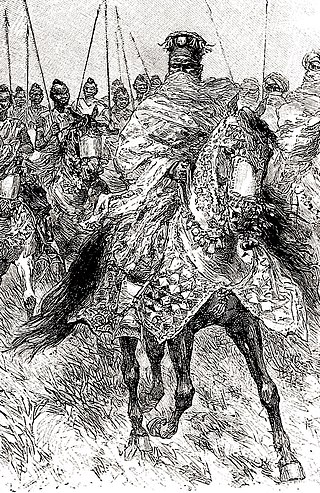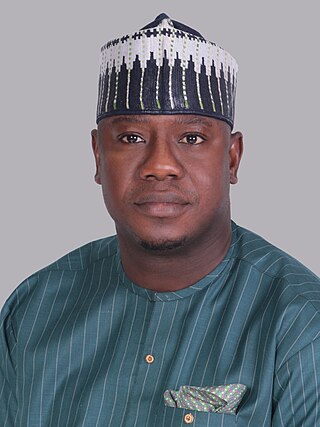Related Research Articles
Yaa Naa Yakubu Andani II (1945–2002) was the King of Dagbon, the traditional kingdom of the Dagomba people in northern Ghana, from 31 May 1974 until his assassination on 27 March 2002. He was born in August 1945 in Sagnarigu, a suburb of Tamale in the Northern Region of Ghana. Yakubu II was killed on 27 March 2002 at Yendi, the capital of the Kingdom of Dagbon, by unknown people when clashes broke out between the two feuding Gates of Dagbon Kingship. For 600 years the Abudu and Andani clans, named after two sons of the ancient Dagbon king Ya Naa Yakubu I, cordially rotated control of the kingdom centred in Yendi, 530 kilometres (330 mi) north of Accra, the capital of Ghana. A regent acted as sovereign of the kingdom until 18 January 2019 when a new ruler is chosen to occupy the revered Lion Skins of Yendi.

The Dagbamba or Dagomba are an ethnic group of Ghana, and Togo. They number more than 3.1 million people. The term Dagbamba is originally extended to refer to other related peoples who were unified by Naa Gbewaa including the Mamprusi and Nanumba. The Dagomba country is called Dagbon and they speak Dagbanli language. Dagbanli is the most spoken language of northern Ghana and second most widely spoken local language of Ghana. Dagbanli belongs to the Mabia (Mole-Dagbani) subgroup of the Gur languages, a large group of related languages in West Africa. The Dagomba practises both patrilineal and matrilineal systems of inheritance.

Osei Tutu II is the 16th Asantehene, enstooled on 26 April 1999. By name, Otumfuo Osei Tutu II is in direct succession to the 17th-century founder of the Ashanti Empire, Otumfuo Osei Tutu I. He is also the Chancellor of the Kwame Nkrumah University of Science and Technology. A Freemason, Otumfuo Osei Tutu II has served as the Grand Patron of the Grand Lodge of Ghana, the Sword Bearer of the United Grand Lodge of England and the Grand Patron of the Grand Lodge of Liberia.

Prince Imoro Andani was a Northern Regional Minister of Ghana. He resigned in 2002 following a violent conflict in Yendi.

GCB Bank Limited formally known as Ghana Commercial Bank is the largest bank in Ghana in terms of total operating assets and share of industry deposits, with 14.2% of total industry deposits. In August 2017, the Bank of Ghana, the nation's central bank, announced that it had approved a Purchase and Assumption transaction with GCB Bank Limited for the transfer of all deposits and selected assets of UT Bank and Capital Bank (Ghana) to GCB Bank Ltd.
Bawa Andani Yakubu, MV (1926–2002) was a police officer, politician and king. He was an Inspector General of Police in Ghana. He also served in the National Liberation Council (NLC) government. He was the Gushie-Naa or Gushie King until his death.

The Damba festival is the largest festival in Ghana, celebrated by the peoples of the Northern, Savanna, North East, Upper East and Upper West Regions of Ghana. In recent times, Damba has become a multinational festival, attracting visitors from all over the world. The festival is annually celebrated in Germany, USA, and UK.

Nyankpala, with the appelation Beyom Yili, is a town located about 10 miles south-west of Tamale, the capital of the Northern Region of Ghana. The University for Development Studies (UDS) has its premier campus located in the town. This campus is the first of the university's campuses, the first to be established in northern Ghana.

Oyeeman Wereko Ampem II, was a Ghanaian civil servant, businessman and traditional ruler. He was Gyaasehene of Akuapem and Omanhene(Paramount Chief) of Amanokrom from 1975 till his death in 2005. He served as Commissioner for Economic Affairs in Ghana from 1967 to 1969 and Government Statistician from 1960 to 1966.

The Kingdom of Dagbon is the oldest and one of the most organised traditional kingdoms in Ghana founded by the Dagomba people (Dagbamba) in the 15th century. During its rise, it comprised, at various points, the Northern, Upper West, Upper East, Savannah Region and North East regions of present-day Ghana. It also covered portions of Burkina Faso, North East Ivory Coast and North West Togo. Since Ghana's independence in 1957, the Kingdom just like all of Ghana's kingdoms and ethnic states has assumed a traditional, customary role.

The Mole-Dagbon, also called Mabia, or Mossi-Dagbon are a meta-ethnicity and western Oti–Volta ethno-linguistic group residing in six present-day West Africa countries namely: Benin, Burkina Faso, Ghana, Ivory Coast, Mali and Togo. They number more than 45 million. The Mole/Mossi/Moore people are located primarily in Burkina Faso while over lord Dagbon is in Ghana. Previously, the term Gur was used, Mabia has been used to refer to the linguistic supercluster.

Bukali II, known as Gariba II, is the current Yaa Naa, traditional ruler of the Kingdom of Dagbon in Northern Ghana.
The Yaa Naa is the title of the king of Dagbon, the Kingdom of the Dagomba people, located in the Northern Region of present-day Ghana. The current Yaa Naa is Mahama Abukari Gariba II. He was enskinned on Friday, January 25, 2019.
The chieftaincy institution in Ghana is a system that structures and regulates the activity of local chieftains in the Ghanaian society and state. This institution served as the governing structure of various societies prior to European Colonisation.
Felix Elvis Addo is a Ghanaian accountant. He is the non-executive chairman of Guinness Ghana Breweries, since 2018. Before this role, Addo was chairman of the Ghana National Petroleum Corporation. Addo is a former Country Senior Partner for PriceWaterhouseCoopers in Ghana and former member of the PwC Africa Governance Board.

Umar Farouk Aliu Mahama is a Ghanaian politician who is a member of the New Patriotic Party (NPP). He is the member of parliament for the Yendi Constituency after winning in the 2020 parliamentary elections.

Ibrahim Mahama is a Ghanaian lawyer, and civil servant. He was Ghana's Commissioner for Secretariats and Departments from 1967 to 1968 and Commissioner for Information from 1968 to 1969.
Kasuliyili is a community under Tolon District in the northern region of Ghana. Most inhabitants of Kasuliyili community are farmers, including women. There are four basic schools, two Junior High Schools, and one Senior High School in the town. It has a clinic for health delivery. Kasuliyili is ruled by the Kasul Lana, who is enskinned by the King of Dagbon, the Yaa Naa.
The Development Bank Ghana (DBG) is a government-owned development bank in Ghana. Owned by the government of Ghana, the institution has received grants and loans for on-lending to Ghana's commercial banks, from the African Development Bank, the World Bank Group, the European Investment Bank, and the German Development Bank. The DBG focuses on providing indirect loans to small and medium enterprises (SMEs), with less than 100 employees each. A key area of interest in their immediate and long term plans is environment, social and governance focus to help build a sustainable economy in Ghana. Fostering solid collaborations to support growth in the economy, generate jobs, and strengthen the capabilities of SMEs is the goal of DBG. DBG offer de-risking services and long-term funding, supported by technology and research and insights that are founded on solid facts. DBG additionally aims to draw in, nurture, and keep talented individuals. Run as a self-sufficient, eminently successful institution. Last but not least, DBG encourage ESG excellence within the companies we sponsor.
Kweku Andoh Awotwi is a Ghanaian businessman, engineer, and mining executive. He currently serves as the Board Chairman of United Bank for Africa (Ghana) Ltd and Multimedia Group Ltd in Ghana, and co-founded the non-profit organization, Playsoccer Ghana.
References
- ↑ Andani, Alhassan. "Alhassan Andani". Archived from the original on 2020-08-05. Retrieved 2019-09-21.
- ↑ "Alhassan Andani Net Worth (2020) – wallmine.com". wallmine.com. Retrieved 2020-10-01.
- 1 2 MarketScreener. "Alhassan Andani - Biography". marketscreener.com. Retrieved 2019-09-21.
- 1 2 3 "Pishigu Lana Alhassan Andani – IAA". Archived from the original on 2019-09-21. Retrieved 2019-09-21.
- 1 2 "Stanbic Boss Andani enskinned chief in Northern Region". ghanaweb.com. 14 May 2018. Retrieved 2019-09-21.
- ↑ "Political News from Ghana and Ghanaian political parties". ghanaweb.com. Retrieved 2019-09-21.
- ↑ "Money Man". The Business Year. Retrieved 2019-09-21.
- 1 2 "Well-Earned Credit". The Business Year. Retrieved 2020-10-01.
- ↑ "Alhassan Andani Now A Member Of Gold Fields Board - News Ghana". newsghana.com.gh. 26 July 2016. Retrieved 2019-09-21.